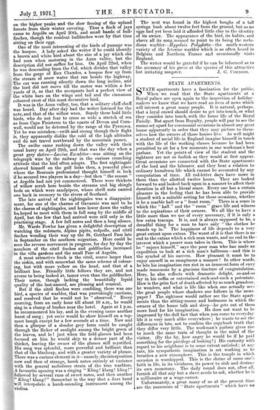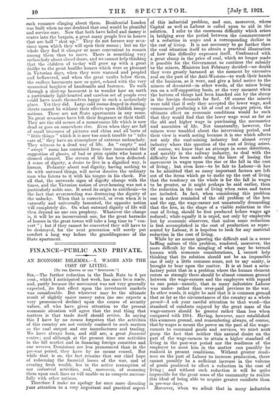STATE APARTMENTS.
STATE apartments have a fascination for the public. When we read that the State apartments at a Royal palace are open again to the inspection of holiday- makers we know that we have read an item of news which will interest a great many people. It is natural, perhaps, that a loyal crowd should desire to get into touch, or what they consider into touch, with the home life of the Royal Family. But apart from Royalty, people will pay to see the rooms set apart for ceremonial occasions in almost any great house apparently in order that they may picture to them- selves how the owners of those houses live. As well might a student of social life in England imagine himself in touch with the life of the working classes because he had been permitted to sit for a few moments in one workman's best parlour. Yet the points of view of the student and the sightseer are not so foolish as they would at first appear. Great occasions are connected with the State apartments of the lord and the labourer, and they bear a relation to ordinary humdrum life which cannot be accounted by any computation of time. All red-letter days have more in them than the allotted twelve hours. They are looked forward to and looked back upon in a manner to affect their duration in all but a literal sense. Every one has a certain pleasure in the feeling that he has been able to provide himself with a suitable setting for these occasions, whether it be a marble hall or a "front room." There is a sense in which the "hall," and the " room " grace life and witness to the aspirations of their owners. We all like to have a little more than we use of every necessary, if it is only a few extra teacups. It is, and is always supposed to be, a dreadful thing for a man to hive only "the clothes he stands up in." The happiness of life depends to a very great extent upon extras. The worst of it is that there is no end to the extras which a rich man wants, and no end to the - interest which a poorer man takes in them. This is where he "enjoys himself," says the poor man who has made an expedition to look at a rich man's ballroom—and this is the symbol of his success. How pleasant it must be to enjoy oneself in so sumptuous a manner I In other words, - he lets his imagination run riot in an innocent form of envy made innocuous by a gracious tincture of congratulation. Here, he also reflects with dramatic delight, so-and-so lay in his coffin or entertained such-and-such a potentate. How is the grim fact of death affected by so much grandeur, he wonders, and what is life like when one actually sees the great people whose shadows one follows in the news- paper ? The sightseer would rather see the State apart- ments than the sitting-rooms and bedrooms in which the owners of the house talk and sleep—he gets out of them more food for his imagination. He does not want to be impressed by the dull fact that when you come to everyday life it is very much alike everywhere ; he wants to see the differences in lots, not to confirm the copybook truth that they differ very little. The workman's parlour gives rise to much the same train of thought in the mind of the visitor. (By the by, how angry he would be if he paid something for the privilege of looking ! ) His curiosity with regard to his neighbour is to some extent satisfied; at any rate, his sympathetic imagination is set working as he breathes a new atmosphere. This is the temple in which occasion is worshipped. This is the shrine of some one's faith in life, in its vividness, its power to sink and destroy its own monotony. The daily round does not, after all, furnish all that any but a slave needs to ask, whether he is a millionaire or a wage-earner. Unfortunately, a great many of us at the present time are the possessors of "State apartments" which have no such romance clinging about them. Residential London was built when no one doubted that coal would be plentiful and service sure. Now that both have failed and money is scarce into the bargain, a great many people live in houses that are half "shut up." They do not foresee any occa- sions upon which they will open their rooms ; but on the whole they find it cheaper or more convenient to remain among them than to move. There is something very melancholy about closed doors, and we cannot help thinking that the children of to-day will grow up with a great dislike to the great boxlike houses which were so pleasant in Victorian days, when they were warmed and peopled and beflowered, and when the great vaults below them, the endless basements now so quiet, echoed with the very unmusical laughter of handmaids and footmen. To walk through a shut-up basement is to wonder how on earth a particularly light-hearted and careless set of people ever could have made themselves happy in such a melancholy place. Yet they did. Large cold rooms draped in dusting- sheets cannot be without their effects upon childish imagi- nations. These are not State apartments in any sense. No great occasions have left their fragrance or their thrill. They are the old scenes of a monotonous life which is now dead or goes on somewhere else. Even when they are full of small treasures of pictures and china and all 'sorts of "little things" which it is now too much trouble to "take care of," they have an atmosphere of extreme melancholy. They witness to a dead way of life. An " empty " and " swept " room has contained from time immemorial the suggestion of ghosts, of bad or grim spirits who haunt a disused channel. The stream of life has been deflected. A sense of dignity, a desire to live in a dignified way, is human. Pedantry about real dignity, having nothing to do with outward things, will never deceive the ordinary man who listens to it with his tongue in his cheek. For all that, the outwards signs of dignity change with the times, and the Victorian notion of over-housing was not a particularly noble one. It owed its origin to antithesis—to the fact that overcrowding was destroying the dignity of the unlucky. When that is corrected, or even when it is earnestly and universally lamented, the opposite notion will completely die. On what outward dignity of life will then depend no one can prophesy. Whatever the change is, it will be an inconvenient one, for the great barracks of houses in the great towns will take a long time to " con- vert " ; but if they cannot be converted they will have to be destroyed, for the next generation will surely put comfort a long way before the grandiloquence of the State apartment.











































 Previous page
Previous page